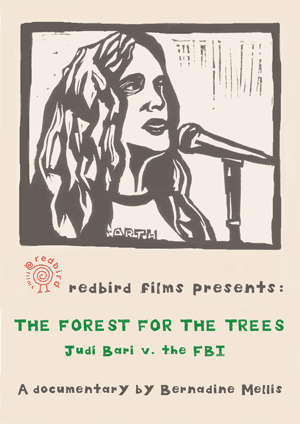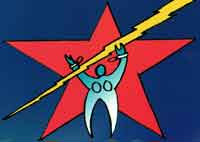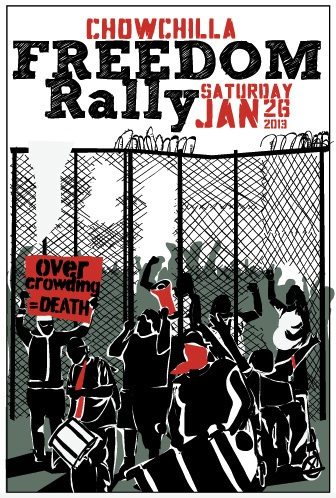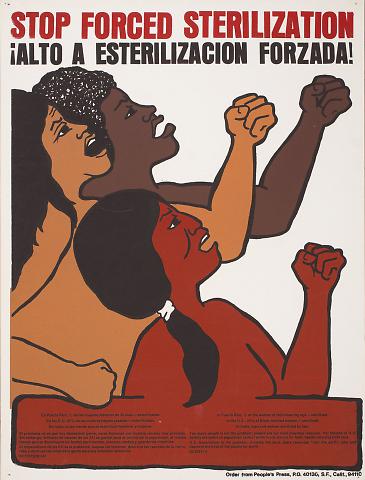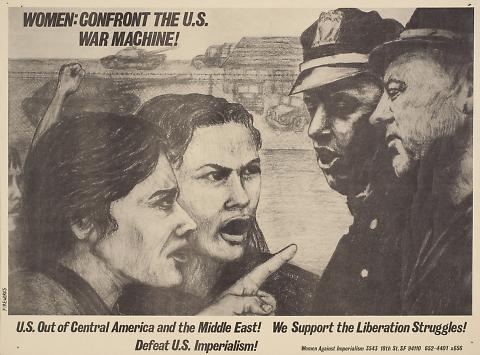Gender and Sexuality
This collection features materials from a number of sources focusing on struggles revolving around gender and sexuality. These struggles are not separate from larger struggles for liberation but specifically incorporate unique voices and perspectives.
Subcollections
-
Connexions
Connexions is the collective product of feminists of diverse nationalities and political perspectives committed to contributing to an international women\'s movement. -
Feminist and Lesbian Politics: Monographs-Periodicals-Articles
This collection contains materials focusing on radical feminist and lesbian politics. While diverse in medium and subject matter, this collection contextualizes women’s liberation highlighting issues of class, race, sexuality and imperialism. -
Materials shot and collected in the making of The Forest for the Trees
Raw materials from the documentary "The Forest for the Trees" which details the amazing story of the fight to clear Earth First! activist Judi Bari's name after her car was bombed and she was arrested as a terrorist. -
Out of Control: Lesbian Committee to Support Women Prisoners
Out of Control (OOC) was a self-supporting committee formed in 1987 to organize resistance to the Lexington Control Unit for women. -
Prisons - Women
This collection contains materials relating to the specific conditions, challenges and struggles facing women in prison. Topics are varied but materials include conference papers, informational materials, legal perspectives and audio recordings. -
Programs produced by Judy Gerber and Laurie Simms
This collection contains grassroots radio programming produced by Judy Gerber and Laurie Simms. This programming primarily occurred during the 1980s and 1990s. -
Sterilization
This collection contains materials focusing on the sterilization of women and efforts to resist this practice. -
Violence Against Women
This collection contains materials focusing on violence against women. Specific topics covered include women who fight back against their abusers, rape, pornography, sexism and self-defense. -
Women Against Imperialism
Women Against Imperialism was a grassroots, feminist, anti-imperialist solidarity organization formed in San Francisco in 1981. Women Against Imperialism’s work primarily consisted of direct action organizing and political education activities.
Documents
7 Documents Found
Date: 9/15/1989Call Number: JG/ 033BFormat: Cass BProducers: Judy GerberCollection: Programs produced by Judy Gerber and Laurie Simms
El Salvador: FMLN and ARENA negotiations in Mexico City. FMLN demanding purification of the army to rid it of the death squads responsible for the assassination of Arch Bishop Romero. Interview of FMLN member. Colombia- Drug War article written in the "Guardian" including its effects on peasants, Bush administration military aid and the emergence of the far right paramilitary forces which enjoys the complicity of the Colombian military.
Date: 9/8/1989Call Number: JG/ 036AFormat: Cass AProducers: Judy GerberCollection: Programs produced by Judy Gerber and Laurie Simms
Guadalupe Gonzales from the FMLN/ FDR speaks on the 9/7/'89 announcement that the FMLN wants to sit down with ARENA Pres. Cristiani for peace negotiations. Judy Gerber reads a NACLA interview w/ ARENA Colonel Juan Zapata, Zapata in ARENA's vice minister of defense, he defines the FMLN as terrorists.
Date: 10/13/1989Call Number: JG/ 036BFormat: Cass BProducers: Judy GerberCollection: Programs produced by Judy Gerber and Laurie Simms
Covers the ARENA/ FMLN negotiations in Costa Rica. 15,000 march in El Salvador to support the negotiations, 40 of the demonstrators arrested by police and considered disappeared. Trade unionists and health workers targeted by ARENA and US Congress writes Cristiani government a check.
Call Number: JG/ 076Format: CassetteProducers: Judy GerberProgram: A Defiant HeartCollection: Programs produced by Judy Gerber and Laurie Simms
January 1991. News on the outbreak of the Gulf War on January 16, 1991 and El Salvador. Report on the trials against FMLN generals who executed American pilots. President Bush released $42.5 million in aide to El Salvador despite protests of the FMLN. 'El Salvador Online' (January 28) reported a brutal army massacre of 15 people in El Zapote. Report on the upcoming March 10 Salvadoran presidential election: 10 registered parties including a "Democratic Opposition" coalition. The ruling Salvadoran ARENA party supports the U.S. war effort but sees bad economic consequences. The FMLN, Salvadoran peasants and labor groups protest the war. The President of El Salvador sent food to the Persian Gulf while 500 peasants marched the U.S. embassy protesting that while the U.S. is waging a "war on humanity" Salvadorans are starving. The Salvadoran Catholic church is concerned about the diversion of American attention to the Gulf and the adverse impact it may have upon insurgency/government negotiations. Report on antiwar protests in the United States.
Date: 1/6/1995Call Number: JG/ 087AFormat: Cass AProducers: Judy GerberProgram: A Defiant HeartCollection: Programs produced by Judy Gerber and Laurie Simms
This is a recording on the political realignments in El Salvador on the Third Anniversary of the ceasefire. Reading of Committee in Solidarity with the People of El Salvador's 'El Salvador Watch' article: "FMLN Redefining and Renewing the Salvadoran Left.' The article describes the December 17, 1994 FMLN party convention in which the group split. While centrist groups departed from the FMLN, the party is in whole solid and reorganizing into a renewed leftist political option. There have also been realignment across the Salvadoran political spectrum including on the right. ARENA has broken off from the Liberal Democratic Party because it supposedly resents the peace. While half the population abstained in the last election, the political reality is much more democratic in El Salvador.
Date: 1/2/1992Call Number: JG/ 127AFormat: Cass AProducers: Judy GerberCollection: Programs produced by Judy Gerber and Laurie Simms
A member of the FMLN recounts the 6 major conjunctures of democratic struggle against institutionalized militarism and social injustice. This begins with the mass insurrections in 1932 after the democratically elected government was overthrown by the Minister of War and ending with the organization of the Peace Agreements in 1992.
Date: 1/1/1992Call Number: JG/ 127BFormat: Cass BProducers: Judy GerberCollection: Programs produced by Judy Gerber and Laurie Simms
Focuses on the corruption and heavy involvement of military forces in drug trafficking and money laundering in El Salvador, as well as the outright subordination of public security over military police. President Cristiani’s decision to reduce the budget for public security, which was put into place after the end of the civil war, is a direct violation of the Peace Accords, which created the National Civil Police as an apolitical force to protect human rights.
7 Documents Found



